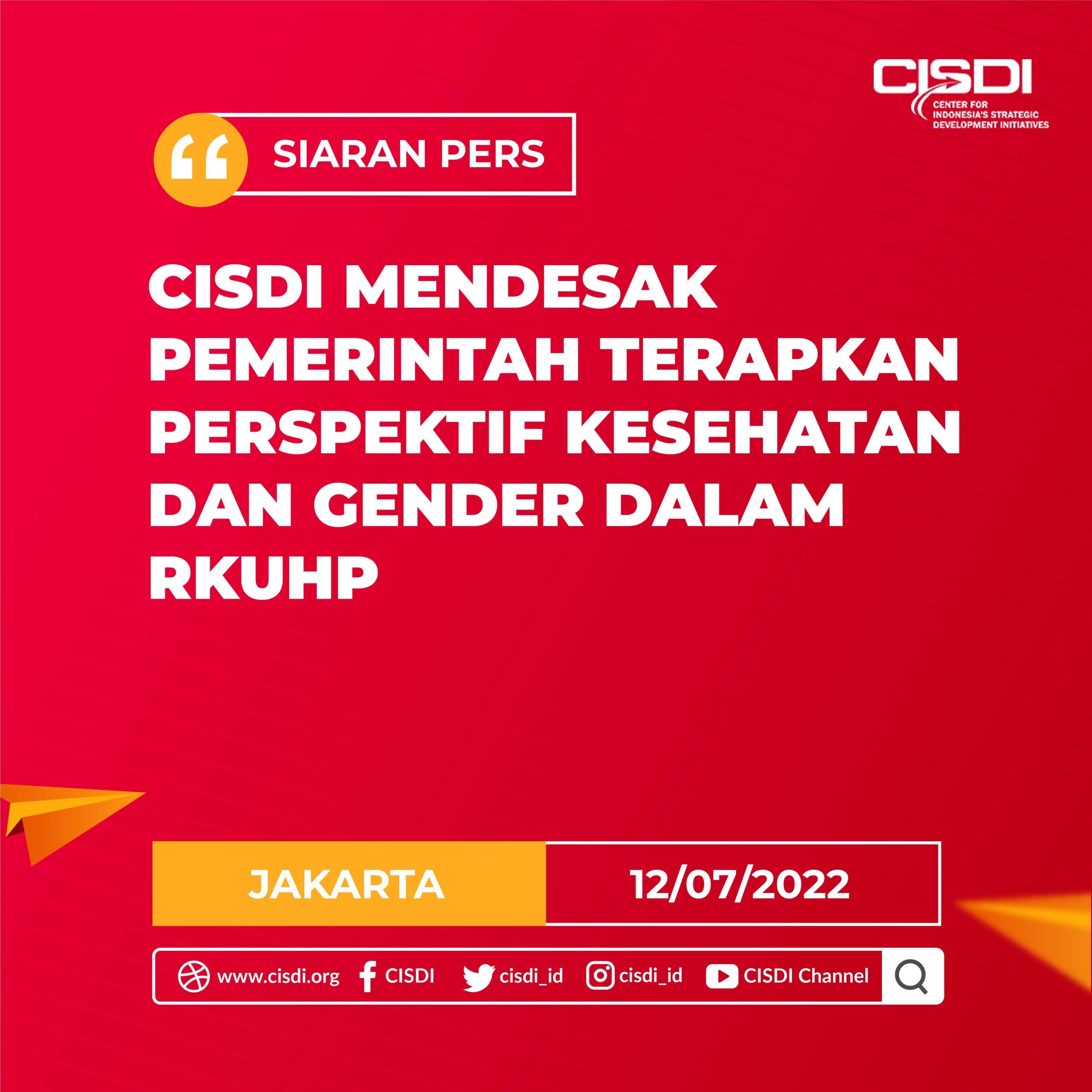
Press Release
CISDI Urges the Government to Apply Health and Gender Perspectives in the Criminal Code
CISDI Secretariat • 11 Juli 2022
Center for Indonesia’s Strategic Development Initiatives (CISDI) urged the government to involve the public for the country’s Criminal Code update (RKHUP), especially those who are mostly affected, as CISDI found few problems on this matter.
Firstly, Sexual and Reproductive Rights (HKSR) for children and teenagers are at risk to be neglected.
In the new draft, those who provide information on contraceptive to children, which is one of the methods of education and promotion of sexual and reproductive health, are likely to receive criminal sanction according to chapters 412 and 414.
"Implementing this article would be contradictory to the Health Law which has guaranteed universal rights, including the right of children that also includes adolescents under the Child Protection Law, to obtain information and counseling related to sexual and reproductive health,” said Olivia Herlinda, Policy Director of CISDI.
Moreover, sexual health promotors will be limited to authorized officers and/or volunteers who are directly ordered by authorized officials. This condition will lead to infectivity in educating children about sexual and reproductive health and service as the vital way of teaching children about this matter is through peer education and community, study revealed (Harianti, 2021).
As Mueller, Gavin & Kulkarni (2003) stated in their paper, the children and adolescents stages are the most important time to teach the young about sexual and reproductive health. Limiting their access to sexual health services will also likely expose them to unsafe free sex that leads to unwanted pregnancies and sexually transmitted diseases to HIV (UNFPA, UNESCO and WHO, 2015).
Secondly, criminalizing consent and private sexual behavior does not reduce unsafe sex behavior among adolescents, but it actually triggers early marriage, as stated in a study by Kumar (2004) on three countries in the Southern Asia: Bangladesh, Nepal, and Pakistan. Criminalization will only encourage parents to marry off their children to avoid social stigmas and criminal threats.
This is also in accordance with the study conducted by Stephani Psaki et al (2021) through a comparative case study in a few countries, including Indonesia. It says that parents tend to fear of the family’s good name, child's virginity, and pregnancy out of wedlock are some of the main driving factors for the rise of child marriage.
Moreover, the latest draft of Criminal Code chapter 415 and 416 also include provisions for parental complaints that have the potential to increase the vulnerability of children to child marriage.
“Without this article alone, the National Commission on Violence Against Women (Komnas Perempuan)’s records in 2022 state that there has been a more than two-fold increase in applications for child marriage dispensations by parents that were granted by religious courts during 2019 to 2020, from 23,126 submissions in 2019 increasing to 64,211 submissions in 2020," she said.
The 2017 National Socio-Economic Survey (Susenas) revealed that there are 63.08% of women aged between 20-24 years old who got married and pregnant before 18. Thus, government must focus on strengthening healthy sexual education and service rather than criminalizing them, which many researches disagree.
The hasty process and minimal involvement of the affected community of the Crime Code’s drafting result in the lack of gender and health perspective. Moreover, there are few chapters that restrict participation and free speech, such as chapter 240 and 241 regarding insults to the government, articles 351 and 352 regarding insults to public power, and articles 263 and 264 regarding the spread of fake news. This condition will likely minimize public involvement, especially from the most affected ones.
“Without transparency, accountability, and public participation, the Crime Code’s drafts are not siding with public perspective, including on health and gender matters, and do not represent public needs as the most affected party.”, said Olivia.
Based on these reasons, CISDI recommends the government to:
- Involve the public, especially the most affected groups in the drafting process to ensure health and gender equality perspective.
- Include health and gender perspective and the affected groups in the drafting process.
- Ensure no discrimination towards women and other vulnerable groups in sexual and reproductive rights as stated in the CEDAW (Convention on the Elimination of All Forms of Discrimination Against Women).
Ensuring access to the fulfillment of universal rights for sexual and reproductive health services and education, especially to children and teenagers instead of criminalizing the behavior.
.png)